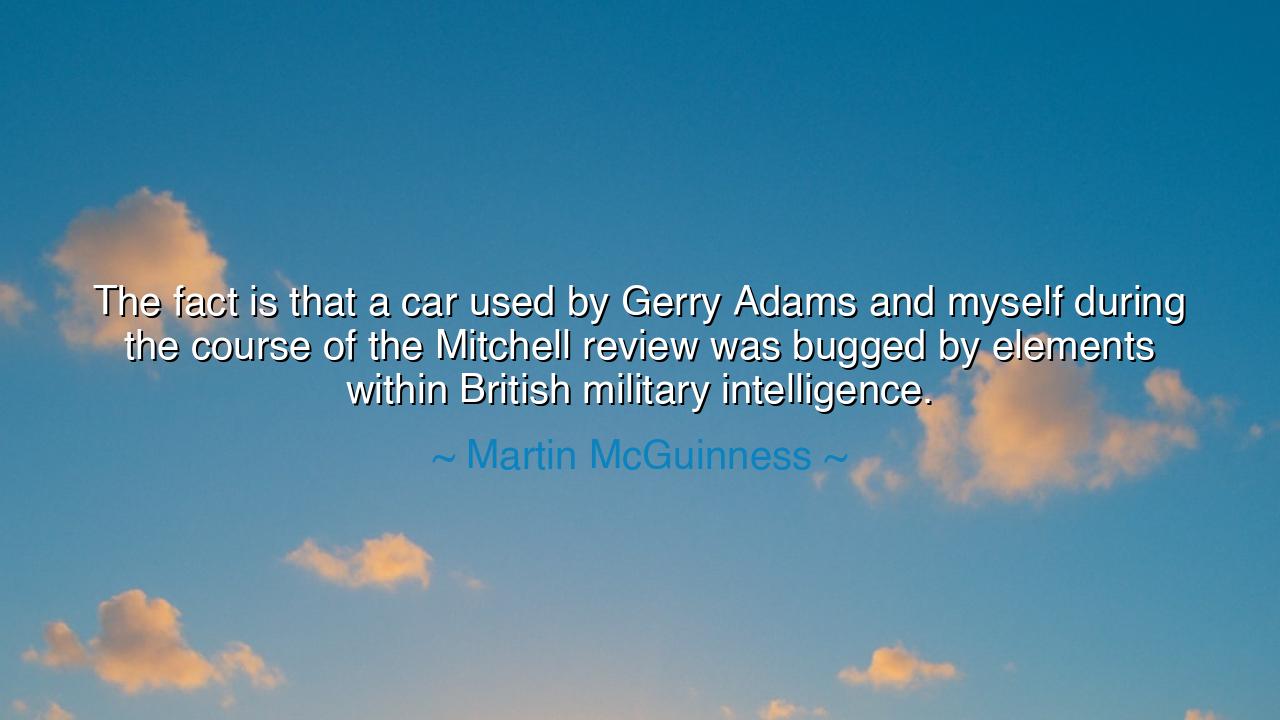
The fact is that a car used by Gerry Adams and myself during the
The fact is that a car used by Gerry Adams and myself during the course of the Mitchell review was bugged by elements within British military intelligence.






In the profound words of Martin McGuinness, "The fact is that a car used by Gerry Adams and myself during the course of the Mitchell review was bugged by elements within British military intelligence." These words speak to the complex and often shadowy realm of espionage, political maneuvering, and the hidden truths that lie beneath the surface of seemingly peaceful negotiations. McGuinness's statement is not merely a reflection on a specific event in history but a powerful reminder of the deceit and intrigue that often accompanies the struggle for power and freedom.
The revelation that the car used by McGuinness and Adams was bugged by military intelligence is not an isolated incident, but part of the broader conflict between Northern Ireland and the British government. It is a reminder that in the pursuit of peace, trust is an essential foundation—one that, when betrayed, can lead to a breakdown of dialogue and understanding. The Mitchell review was a key effort to find common ground between the conflicting parties, yet even during this critical time of negotiation, there were those who sought to undermine the process by listening in on private conversations, manipulating the flow of trust. The act of bugging represents not only a breach of trust but a subversion of the very ideals that negotiations were meant to uphold: honesty, openness, and the belief in dialogue.
Consider the wisdom of Aesop, the ancient storyteller who understood the dangers of deceit. In his fable of the boy who cried wolf, the boy repeatedly lies, causing the villagers to trust him less and less. When the wolf finally comes, no one believes him, and disaster strikes. The fable teaches a powerful lesson: once trust is broken, it is incredibly difficult to rebuild. McGuinness’s statement highlights how the act of bugging—an intrusion into the most private of moments—serves to undermine any hope of reconciliation and mutual understanding. In the context of the Northern Ireland conflict, this breach of trust by the British military intelligence echoes a deeper historical pattern of distrust between the British state and the Irish people, a legacy that continues to haunt the pursuit of peace.
The bugging of leaders during such a critical time is reminiscent of the Cold War, a period defined by secrecy, paranoia, and constant surveillance. Leaders on both sides of the ideological divide were often under the watchful eyes of intelligence agencies, their private conversations intercepted and manipulated for political gain. This tension between public diplomacy and covert action reminds us of the precariousness of political negotiations, where every word spoken in earnest may be twisted, misused, or even weaponized. In these moments, the integrity of leaders and their willingness to compromise are tested not only by their convictions but by the very forces that seek to control the narrative.
In McGuinness’s words, we are reminded that the pursuit of peace is rarely a straightforward or simple endeavor. The road to resolution is often fraught with obstacles, many of which are placed by those who fear change or seek to maintain their power through division. In Northern Ireland, the peace process was a fragile balance of diplomacy, strategy, and personal sacrifice. Yet, even as progress was made, the lurking presence of intelligence agencies attempting to subvert the process serves as a stark reminder of the forces of disruption that often work in the shadows to prevent progress.
The lesson to be drawn from this revelation is not simply about the betrayal of a single moment but about the broader nature of political struggle and the importance of trust. In our own lives, we must recognize that trust is a fragile thing—once broken, it is difficult to rebuild. Transparency and honesty must be the cornerstones of our interactions, especially when navigating complex situations. Whether in relationships, workplaces, or communities, we must be aware of the hidden forces that might seek to manipulate our words, twist our intentions, or betray our confidences. True leadership, as McGuinness’s life and words show, is not about maintaining power through secrecy and deceit, but about fostering a culture of openness, accountability, and integrity.
Let us, then, take this lesson with us into our daily lives: in every negotiation, in every relationship, in every political or personal battle, let us be mindful of the value of trust. Let us avoid the temptation to spy, deceive, or manipulate, and instead choose the path of openness and truth. For in the end, it is not the secretive actions or the covert moves that lead to lasting peace and understanding, but the willingness to be transparent, to listen with sincerity, and to treat others with the dignity they deserve. Only then can we build a world where trust is not so easily broken, and where peace is not a fleeting moment, but a lasting reality.






AAdministratorAdministrator
Welcome, honored guests. Please leave a comment, we will respond soon